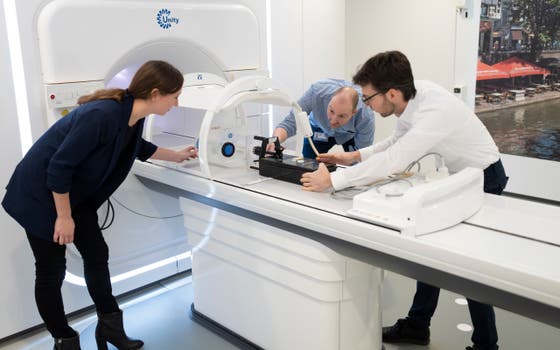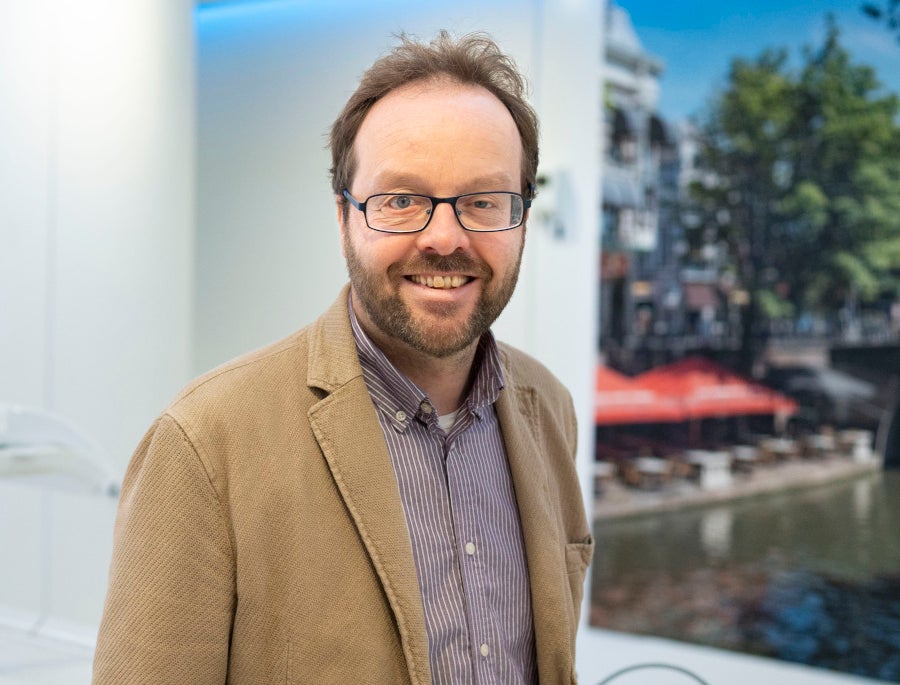UMC Utrecht and Philips speed up development of image-guided treatments

UMC Utrecht and Philips are bringing together healthcare professionals, researchers and technicians in a 'fieldlab'. Here, they will develop new innovative technology and software to benefit healthcare. The goal is to devise less burdensome and more efficient treatments for patients, while at the same time realizing a more sustainable healthcare system.
The joint field lab is a research environment in which UMC Utrecht and Philips are working on new, so-called 'image-guided' treatments. This collaboration is part of UMC Utrecht's strategy to develop more of these techniques. Philips provides its expertise in diagnostic scanners, such as MRI scanners, and AI and data applications.
Relieve healthcare system
Image-guided treatment is a method of treating patients in a more targeted and less invasive way. This is much less burdensome for patients. And people don’t need to be hospitalized for such treatments. This type of therapy is mainly used with cancer, cardiovascular and neurological diseases.
"At UMC Utrecht, we have a lot of expertise in image-guided treatments, especially for cancer. We use imaging equipment such as MRI, CT, X-ray and ultrasound to map tumors very precisely," says Nico van den Berg, professor of computational imaging at UMC Utrecht.
"Then, we are eager to treat the disease as precisely as possible, and, depending on the type of tumor, to immediately start the right treatment. This can be done, for example, by administering medication inside the body. Or by more targeted and intensive radiation therapy with the MR-Linac. We can also operate minimally invasively through smaller incisions," Nico explains.
UMC Utrecht considers image-guided techniques as an important solution to relieve the current tension in the healthcare system (staff shortage, high healthcare costs). Image-guided treatments are minimally invasive, or even completely non-invasive, and thus put much less demand on operating rooms and intensive care units, which are needed for conventional surgical treatments. They also take place on an outpatient basis, so a day care procedure or a short visit is sufficient for patients.
This is obviously much less burdensome for the patient, but also ensures that more patients can be better served in less time. Plus, healthcare personnel, such as nurses, experience less pressure, as fewer patients need to be admitted. Furthermore, healthcare costs can also be significantly reduced by all of this.
Improve treatment with AI and data
The other focus of the field lab is to better support treatments with data and AI. That is, the researchers would like to use AI to get to the bottom of the large amount of available patient data from clinical trials more quickly, and interpret and use it for more effective, widely applicable healthcare.
"I am enormously proud that, in this fieldlab, we are building on the many years of successful collaboration with UMC Utrecht on MRI and are taking a new step rearding data and AI to improve healthcare as well," says Ruud Zwerink, Business Leader MR at Philips.
Long history of innovations
For many years now, UMC Utrecht and Philips have cooperated to develop and introduce new healthcare technologies.
One of the success stories, for example, is the MR-Linac, in collaboration with Elekta. This is a radiotherapy device and MRI scanner in one, which can be used to treat cancer very precisely. As a result, a patient will need less frequent treatment: for example, prostate cancer requires only five radiation sessions instead of 20 thanks to the MR-Linac technology. The MR-Linac could also make radiation an effective alternative to surgical treatment for certain types of cancer.
Another joint research project focuses on radioembolization. This is a form of internal radiation therapy to treat patients with liver cancer or metastases in the liver. A new hybrid C-arm has been developed for this purpose. With this device, radioembolization can be monitored live and more clearly. The treatment takes only two hours instead of two weeks due to this new technology.
For tomorrow’s healthcare
All the innovations being worked on in the field lab will benefit patient, hospital and healthcare as a whole.
Nico van den Berg: "At UMC Utrecht, we are constantly coming up with new and improved image-guided treatment methods. We then develop these in collaboration with Philips, among others. The new fieldlab will accelerate this innovation process through more intensive contact. Technical researchers and engineers work in close consultation with doctors and lab technicians on tomorrow's new treatments, resulting from today's clinical needs."

